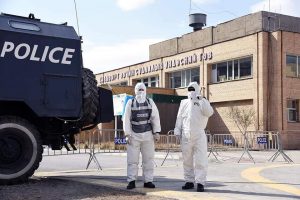As another wave of COVID-19 spreads around the world, Mongolia is particularly hard hit with the pandemic. Although Mongolia stayed free from this deadly virus for almost 10 months, thanks to drastic measures such as closing its borders, canceling international flights, closing all educational facilities, and even banning the national holiday of Tsagaan Sar (Lunar New Year) and Naadam Festival, the latest wave has brought an explosion of cases. Daily case counts first crossed the 100 mark in early March; now they routinely top 1,000. Over the past week, over 8,000 new cases were registered, bringing the total number of COVID-19 cases above 26,000. This is highest number per million people in the Asia Pacific region.
The country has suffered 56 COVID-19 deaths and 400 health workers have been infected with the virus, exacerbating already strained medical infrastructure that has only two ECMO life-support machines for its 3 million people.
What went wrong?
The biggest blame must go to the ruling Mongolian People’s Party. Although the MPP has been in power since the start of the pandemic, it changed the leadership of the State Emergency Commission, Ministry of Health, and National Center for Infectious Diseases three times each, without much improvement. Even the resignation of Prime Minister Khurelsukh Ukhnaa in January 2021 after mass protests against mistreatment of a suspected COVID-19 infected woman and her newborn baby, and the subsequent appointment of the country’s youngest prime minister ever, Oyun-Erdene Luvsannamsrai, could not change the situation for the better.
Meanwhile, because of the snap decision to close the borders and cancel international flights in March 2020, more than 10,000 Mongolians were stranded in about 40 different countries abroad. Their only possibility of returning home was a few chartered flights with limited seats. Only 260 seats are available on each plane and flight crews and passengers must be kept in quarantine for 21 days, making for a huge backlog of would-be travelers. Many Mongolians trapped in a foreign country are frustrated with how Ministry of Foreign Affairs and MIAT (Mongolian Airlines) are handling the registration for flights. In one instance, an 82-year-old man in a wheelchair complained on Facebook that he had called the Mongolian Embassy in Seoul to be registered on a charter flight 653 times, and yet none of his calls was answered. The fact that the son of the deputy prime minister and the wives and relatives of other politicians flew on those charter flights caused a public outcry. Although the number of these flights has increased since Oyun-Erdene took his office in January, many people still stranded abroad are seeking repatriation.
Part of the delay in repatriating all the stranded Mongolians is due to the lack of government-designated facilities, where repatriated citizens have to be quarantined for three weeks. Unfortunately, the first case of community transmission was registered at one of these places and around 40 people were infected with COVID-19 in that outbreak. Mismanagement, lack of proper oversight, and gross negligence of competent authorities were the causes of this failure.
Throughout the pandemic, the MPP government has earned a reputation for indecisive actions, inconsistent decisions, and mixed messaging on wearing masks and social distancing. All of these missteps contributed to the current COVID-19 wave. During the current 14-day long lockdown that started on April 10, for instance, health workers could not use their private vehicles every other day due to license plate number restrictions and public transportation was overcrowded because of restrictions on their operating hours. After public protests, the National Emergency Commission (NEC) reversed its decision and allowed health workers to use their cars and extended public transport operating hours.
In another example, the head of the Capital City Emergency Commission, Sumibazar D., announced that vaccination work will not be interrupted during the lockdown. But the next day, the head of the NEC, Amarsaikhan S., announced that all vaccinations will be ceased to prevent overcrowding at vaccination stations.
Many people believe that mass gatherings and huge concerts commemorating the 100th anniversary of the MPP last March, where MPP leaders and artists did not wear masks, are the biggest factor behind the recent COVID-19 infection spike in the country.
Mongolian leaders failed to effectively use the 10 months the country was COVID-19 free to prepare the health system for better management and resilience. Instead, millions of dollars have been wasted on such projects as a water fountain (not even connected to the central water system) on the main square of Ulaanbaatar, a museum for Chinggis Khaan, and a local airport in Khentii province.
Meanwhile, authorities use the COVID-19 pandemic as a pretext to restrict human rights, especially the freedom of expression and the right to peaceful assembly. The whistleblower who first informed the public that a government-designated quarantine facility had become an epicenter of COVID-19 spread is now facing criminal charges. In many instances, inhumane treatment by police has caused public outrage: in Khuvsgul province, police officers forced a woman suspected of having COVID-19 to walk for 20 kilometers; a 17-year-old teenager had to stay outside in -15 C temperatures for several hours for being a suspected COVID-19 case; and a man had to walk with his sick 4-month-old baby for 2.5 km.
Mongolian people are especially upset with the double standards of politicians. While several COVID-19 patients passed away without being able to see their loved ones because of strict regulations, the wife of the deputy prime minister entered the “red zone” of the National Center for Infectious Diseases, accompanying her parents, and left the place without passing mandatory quarantine.
The recent spike in cases suggests that Mongolia’s previous success may have been due to luck rather than solid policy. There are serious holes in the government’s response, and now the Mongolian people are paying the price.

































